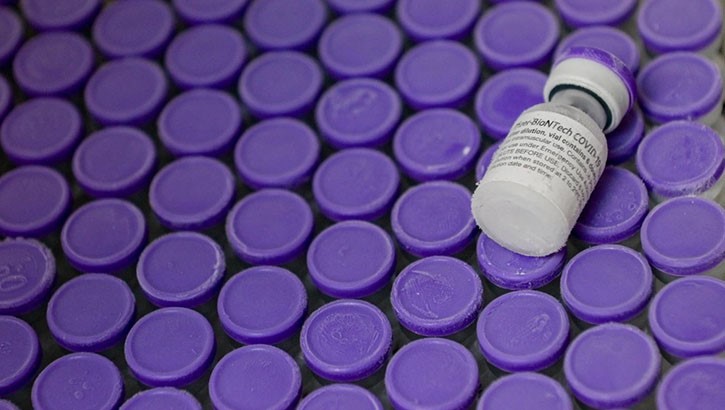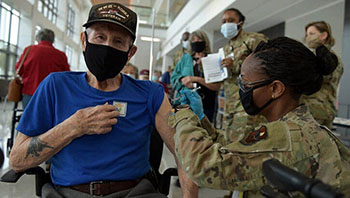COVID-19 Booster Shots are Now Available – What You Need to Know
 Pfizer vaccines at Moody Air Force Base, Georgia, Sept. 9, 2021. Each Pfizer vial contains six doses for vaccination against the COVID-19 virus. (U.S. Air Force photo by Senior Airman Rebeckah Medeiros)
Pfizer vaccines at Moody Air Force Base, Georgia, Sept. 9, 2021. Each Pfizer vial contains six doses for vaccination against the COVID-19 virus. (U.S. Air Force photo by Senior Airman Rebeckah Medeiros)
Booster shots of Pfizer-BioNTech's COVID-19 vaccine are now available at military medical treatment facility and Department of Defense vaccination sites.
Those eligible for a Pfizer-BioNTech booster shot may also get them at commercial sites, such as civilian pharmacies or doctors' offices
All COVID-19 vaccines, including Pfizer-BioNTech's booster dose, may be given at the same time as the influenza vaccine (or other vaccines which may be due).
Fully vaccinated is still defined by the Centers for Disease Control and Prevention (CDC) as completing the 2-dose series for Pfizer-BioNTech or Moderna vaccines and the 1 dose for Johnson & Johnson/Janssen vaccine.
Booster Shots
Booster shots are now formally recommended for certain groups of people under an Emergency Use Authorization, according to recent announcements from the Food and Drug Administration (FDA) and the CDC.
For now, eligibility for a booster shot is limited to those who previously received a two-dose Pfizer-BioNTech COVID-19 vaccine for their initial vaccination.
At this time, booster shots are not recommended for those who initially received the Moderna two-dose vaccine and the Johnson & Johnson/Janssen single-dose vaccine or a mixed series of vaccines. However, those two populations will likely be recommended to receive a booster shot, and a formal recommendation for that may be forthcoming later this year as additional data are reviewed, according to the CDC.
Eligibility to voluntarily receive a single Pfizer-BioNTech booster vaccine includes people who are:
- 65 years and older and residents in long-term care facilities
- 18 and older in long-term care settings
- 50-64 with underlying medical conditions
- 18-49 with underlying medical conditions based on their individual benefits and risks
- 18-64 who are at increased risk of COVID-19 exposure and transmission because of occupational or institutional settings such as teachers, frontline health care workers and essential workers, and those incarcerated, based on their individual benefits and risks.
To become eligible for a booster shot, there is a there is a six-month waiting period after the completion of the second dose of the Pfizer-BioNTech 2-dose vaccine.
Booster doses are not currently part of the DOD or federal worker mandates for COVID-19 vaccine requirements.
Proof of an underlying condition or an occupational risk is not required to receive a booster dose at an MTF or DOD vaccination site, and self-reporting of a condition eligible for a booster shot is allowed at any site where vaccines are available.
Comirnaty
The Pfizer-BioNTech COVID-19 vaccine is also known as the "Pfizer-BioNTech Comirnaty vaccine." The initial Pfizer-BioNTech vaccine was authorized for use under an FDA Emergency Use Authorization earlier this year, and the same vaccine assumed the new name, Pfizer-BioNTech Comirnaty, when it was fully approved by the FDA on Sept. 23. The two vaccines may be used interchangeably.
 Air Force Maj. Carla Cox, 59th Medical Wing commander’s executive officer, provides a COVID-19 vaccine to a San Antonio Military Health System beneficiary at Wilford Hall Ambulatory Surgical Center, Joint Base San Antonio-Lackland, Texas. (U.S. Air Force photo by Staff Sgt. Amanda Stanford)
Air Force Maj. Carla Cox, 59th Medical Wing commander’s executive officer, provides a COVID-19 vaccine to a San Antonio Military Health System beneficiary at Wilford Hall Ambulatory Surgical Center, Joint Base San Antonio-Lackland, Texas. (U.S. Air Force photo by Staff Sgt. Amanda Stanford)
The Comirnaty name (pronounced koe-mir' na tee) was developed from taking the Co from COVID-19, followed by the mRNA in the middle and ending with the 'ty' as a nod to immunity and community.
Third Shot vs. Booster
There is an important distinction between "booster shots" and "an additional dose."
A booster shot of the Pfizer-BioNTech COVID-19 vaccine is recommended for certain individuals at least six months after the second dose of the two dose Pfizer-BioNTech series. A booster shot aims to increase, or "boost", waning immunity observed over time, especially in those 65 years and older and residents of long-term care facilities. A familiar analogy of a booster shot may be the tetanus booster that is recommended every 10 years.
The option for an "additional dose" of mRNA vaccine (Pfizer-BioNTech or Moderna) was recommended in August for a comparatively smaller group of people who have compromised immune systems. This, unlike the booster dose, is because the primary 2-dose series of Pfizer-BioNTech or Moderna may not have resulted in a good enough antibody response; therefore an additional dose is recommended. The timing of an "additional dose" is at least 28 days after the second dose of an mRNA vaccine.
What about Moderna or Janssen Booster Doses?
Health officials may soon make a decision about whether to expand the recommendation for a booster beyond just those who received the Pfizer-BioNTech vaccine.
Moderna has already submitted data to the FDA for booster authorization. "A decision is expected soon," National Institutes of Health Director Francis Collins said Sept. 28. Earlier in September, J&J/Janssen submitted new data in support of a booster for its vaccine.
It's Time to Get Vaccinated
Both FDA and CDC noted that the populations most vulnerable to the SARS-CoV-2 coronavirus that causes COVID-19 continue to be those who are unvaccinated, and the nation's priority should remain getting everyone vaccinated with their primary series.
The approved and authorized COVID-19 vaccines continue to be effective in reducing severe, cases, hospitalizations, and deaths, even against the dominant Delta variant.
Most COVID-19 severe cases, hospitalizations, and deaths occur among the unvaccinated, around 99% of the time.
Hospitalizations rates are 10 to 22 times higher among unvaccinated adults compared to vaccinated adults, according to the CDC.
The CDC's Advisory Committee on Immunization Practices and the FDA Vaccines and Related Biologicals Advisory Committee will continue to follow the scientific data, and evidence will inform booster shot recommendations beyond the current ones.
Experts are looking at all available data to understand how well current vaccines are working for different populations - including looking at new variants Delta and Mu - to see how they affect vaccines' effectiveness.
While the COVID-19 vaccines currently available work to prevent severe illness, hospitalization, and deaths, public health experts are starting to see reduced protection, especially among certain populations, against mild to moderate disease.
"FDA and CDC have determined these booster shots can begin, based on the latest data and evidence, after a thorough, independent and transparent process of evaluating safety and effectiveness," the White House said in a Sept. 24 statement.